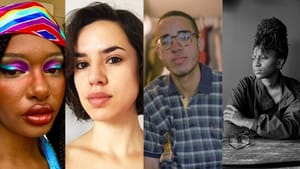Stay in the Loop
BSR publishes on a weekly schedule, with an email newsletter every Wednesday and Thursday morning. There’s no paywall, and subscribing is always free.
Opening doors for local filmmakers of color
BlackStar’s new Filmmaker Lab supports Black, Brown, and Indigenous voices on the rise

For over a decade, Philadelphia’s BlackStar Film Festival has opened doors—both literally and figuratively—to showcase the African diaspora and global communities of color’s rich visual storytelling while making sure those voices that shape these stories are heard. Initially dubbed “the Black Sundance” by its community members, it’s a label that now doesn’t quite fit the global diasporic reach of the festival or its offerings. Today, the festival offers year-round programming, a cultural magazine, podcast, and a new yearlong fellowship that supports and uplifts Black, Brown, and Indigenous emerging and mid-career artists and filmmakers in the Greater Philadelphia area.
Talent in the Lab
Maori Karmael Holmes, artistic director and CEO of BlackStar, likens the new venture, in partnership with Xfinity, to on-ramping local filmmakers into the television and film industry—much like Insecure, the popular HBO series created by actress and comedienne Issa Rae, did for many Black, Brown, and Indigenous filmmakers, writers, and directors in Hollywood. “The way that Insecure helped shape the careers of many, I want people who live in the Philadelphia area to know that there’s a program that on-ramps local filmmakers in a similar way,” said Holmes. “There’s so much rich talent in our backyard, and they deserve to be recognized and supported.”
BlackStar has evolved into an “umbrella organization” of sorts over the last two years. With increased financial support from philanthropic foundations, the organization has branched out to fully support the festival and its programs while also growing its staff. With a runway to extend its reach as well as with the offerings to promote and showcase global communities, Holmes and her team—who are all filmmakers—asked themselves an important question: what did they wish they learned or had access to when they created their films?
“It was a question we asked ourselves when we were developing the Lab. What were the skills, resources, but most importantly knowledge, we wish we learned or, in many ways, still learning in making it in the business?” Holmes said.
In October 2021, BlackStar, in partnership with Xfinity, announced the inaugural class for the Philadelphia Filmmaker Lab. The yearlong fellowship supports and uplifts emerging and mid-career filmmakers and artists of color in the Greater Philadelphia area by providing access to equipment, funding, and mentorship. The 2021 class includes Bettina Escauriza, Jasmine Lynea, Julian Turner, and Xenia Matthews. Over the year, BlackStar acts as an executive producer on the short films created during the Lab, providing feedback on works in progress, and classes and seminars on topics such as cinematography, screenwriting, film editing, and casting. Xfinity provides a major portion of the funding for production. Additionally, shortlisted candidates who did not receive a fellowship this cycle will receive one-on-one consultation from industry representatives courtesy of Kickstarter.
BlackStar also unveiled the inaugural Music in Cinema Fellowship recipient, supported by Pop Culture Collaborative. The one-year Music in Cinema Fellowship embeds one musician in BlackStar’s year-round work to design activities intended to bring more Black, Brown, and Indigenous musicians into the world of filmmaking. The inaugural fellow is David “lil’dave” Adams, who will compose this year’s projects.
“A lot of fellowships that I’ve encountered are more focused on professional development without art practice,” said Escauriza, who originally hails from Paraguay and now lives in Philly and whose project, Tonight, We Eat Flowers, tells the story of a person who sells hold music to companies. “I’ve received valuable mentorship from an experienced filmmaker so far in the program helping me to demystify the film industry, which at times feels inaccessible to someone like me.”
Additionally, each of the fellows’ projects will premiere at the next BlackStar Film Festival in August 2022 and will be featured on Black Experience on the Xfinity Channel. BlackStar plans to reopen applications for their next class in August, as well.
Creating space and making opportunity
Besides mentorship, fellows are paired with a producer for their project and receive a curriculum that includes production intensive courses that are either full or half-day, masterclasses, and workshops, all spotlighting the facets of what it takes to make a short film. Courses are led by prestigious local talents such as Heidi Saman and Ozzie Jones.
Holmes and her team at BlackStar structured the curriculum so that the fellows could focus on creating their art without worrying about securing money for their projects.
“For a few of the fellows, this is their first time getting a crash course in exactly what they want to do without feeling the pressure of having to play financier, producer, director, writer, and sometimes actor in their works. They can freely learn all aspects that go into making their short film and focus on that,” Holmes remarks.
“Continuing on my filmmaking journey, I’m learning what it means to be a director in the purest sense,” said Lynea, whose project, The Love Machine, is a hybrid sci-fi fantasy short film set in West Philadelphia. “Although I have directed projects in the past, this is my first time being a director without playing multiple roles. I truly get to focus on the vision with guidance.”
Holmes also sees the Lab as a way to lower barriers of entry for filmmakers of color. “So much of the industry is catered to those who are rich, cisgender, and white,” Holmes said. “Our goal is to make sure these films are seen widely and can be shown at international film festivals like Cannes or sold to streaming services like Netflix, and that these filmmakers are afforded opportunities like their white counterparts.”
Sign up for our newsletter
All of the week's new articles, all in one place. Sign up for the free weekly BSR newsletters, and don't miss a conversation.

 Jared Michael Lowe
Jared Michael Lowe